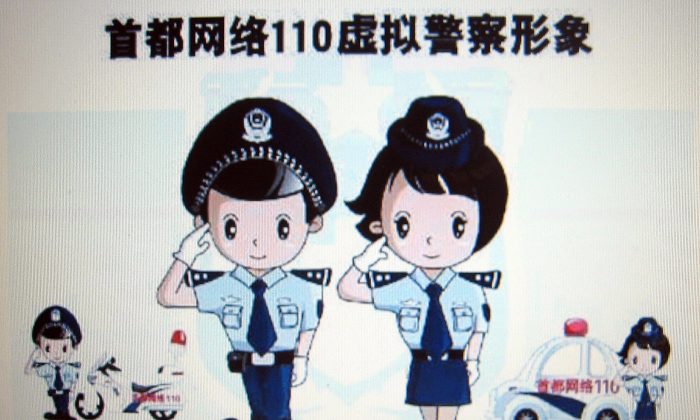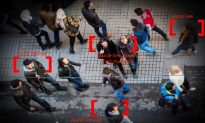6 Chinese Spy Programs That Are Worse Than ‘Big Brother’ in Orwell’s ‘1984’
March 10, 2016

A cartoon image of the "Beijing Internet Police" are seen on a computer screen in China, reminding Internet users they're being watched. (STR/AFP/Getty Images)
In his 1949 book, “1984,” George Orwell warned of a dystopian future where the authoritarian “Big Brother” regime monitors its citizens through television-like “telescreens,” and has created elaborate systems for social control.
Today, the Chinese Communist Party (CCP) has far surpassed the oppressive regime in Orwell’s vision, and here are six spy programs they’ve used to do it.
1) “Big Intelligence”
The Chinese regime is spying on every one of its citizens, including top leaders of the CCP. It does this through a program called “Big Intelligence,” which is operated by its Ministry of Public Security.
The program was revealed in 2014, and had already been running for close to 10 years. The former chief of the Chongqing Public Security Bureau told Sound of Hope Radio that using “Big Intelligence,” the CCP can review all 1.3 billion Chinese people in 12 minutes, every person on China’s wanted list in 4 minutes, and every driver’s license in China in 3.5 minutes.
“Big Intelligence” is a dragnet surveillance program that puts Orwell’s fictional “telescreens” to shame. It gathers information from surveillance cameras located everywhere from taxis, to street corners, to shops, and uses this information to track people down. Sound of Hope Radio noted the CCP had been installing hundreds of thousands of surveillance cameras in every city. In 2014, the system had more than 50,000 surveillance cameras in Chongqing alone.
Police in Beijing announced in October 2015 their network of surveillance cameras were manned by more than 4,300 officers who monitor “100 percent of the capital.” The systems are commonly used to track religious believers and political dissidents.
2) The “Social Credit System”
What’s an authoritarian regime, if it doesn’t persecute people for independent thought? In Orwell’s vision, citizens are persecuted for “thought crimes.” It’s the same way under the CCP, where even user agreements for most major tech companies forbid “thought” and “speech” if it challenges the CCP’s rule.
But the Chinese regime takes it a few steps further with its Social Credit System. This program gathers all available information on every Chinese citizen, then uses it to assign each person a rating. Since this rating can affect a person’s ability to get a job, take a loan, or buy a house, it functions as a tool that facilitates self-censorship.
Since the Social Credit System also can lower someone’s rating if they have a friend or family member with a low rating, it creates an environment where friends and family members are expected to enforce the CCP’s policies on each other.
Chris Chappell, host of China Uncensored, described the program in May 2015, as “kind of like Yelp, only, instead of customers going to a restaurant and giving it a score, it’s the Communist Party, giving a score, to every one of the 1.3 billion people living in China.”
3) Internet Police
If you’re living in an environment without free thought or free speech, you can still usually find solace on the Internet—which grants some level of anonymity. That’s not the case in China.
In an assessment on Internet freedom in 65 countries around the world conducted by independent watchdog organization Freedom House in 2015 China ranked dead last—lower than even Cuba and Syria.
Part of this low score can be attributed to the CCP’s agents who monitor online discussions, pull content offline, and report netizens to the proper authorities. And it also employs a massive network of an estimated 500,000 Internet trolls, known as the “50-cent army,” employed to promote and defend the CCP’s online propaganda globally.
Among the many Internet crimes that can get you arrested in China are “spreading rumors” that fall outside the CCP’s narrative on news stories, criticizing the Chinese regime, and promoting subversive concepts like “democracy.”
4) Car Spying
One of the big flaws with using surveillance cameras and the Internet to spy on citizens, is that as soon as they jump into a car, they’re much harder to track.
The CCP has found a way around this. In addition to police surveillance cameras installed in taxis, they’ve started requiring drivers to carry electronic IDs that track the vehicles.
The first stage of the program is being tested in Shenzhen, where the CCP recently issued 200,000 of the ID cards to drivers of vehicles including commercial transport trucks and school buses. According to Reuters, if the program goes according to plan, the CCP will expand it for all private cars in the city.
Of course, the CCP has used similar systems in the past. In 2011, it was revealed that Chinese authorities were installing spy devices on all dual-plate Chinese-Hong Kong vehicles. The spy devices could listen to conversations and track the vehicles and were being hidden in “inspection and quarantine cards” from the Shenzhen Inspection and Quarantine Bureau.
5) Spying on Gadgets
It’s becoming more common for governments everywhere to spy on phone calls, but the CCP again has them beat with its elaborate spy systems either installed on devices with cyberattacks, or pre-installed at the factory level.
During the 2014 pro-democracy protests in Hong Kong, many of the protesters had their computers, cellphones, and tablets hacked in what researchers foundwere elaborate Chinese cyberattacks targeting democracy activists.
Related Coverage
Michael Shaulov, CEO of Lacoon Mobile Security, helped uncover the cyberattacks aimed at smartphones, and he said the breach could give a government actor access to every part of the phones—including the camera, microphone, internal history, and GPS location. He said, “For the purpose of spying it’s probably the perfect tool.”
Chinese companies also have a long track record of selling phones and other devices with viruses and spy programs already installed on them, which relay user data back to China.
6) Pre-Crime
Even if you do manage to avoid “thought crimes” in China, you may still have to look over your shoulder. The Chinese regime is now looking for ways to detect “pre-crime.”
According to Bloomberg, the CCP directed one of its largest state-run defense contractors, China Electronics Technology Group, to build new software that collects information on people’s jobs, hobbies, buying habits, and other behavior.
The CCP’s new “pre-crime” detection system, Bloomberg notes, “is unprecedented because there are no safeguards from privacy protection laws and minimal push-back from civil liberty advocates and companies.”
The CCP is pitching the idea as a way to prevent terrorist attacks, but the Chinese regime often masks its authoritarian spy programs as systems to search for terrorists. With the CCP’s new “anti-terror” law, for example, Zhao Yuanming, a senior Chinese legal expert, told NTD Television in February 2015, “I believe such anti-terrorism law is intentionally trying to blur the line between anti-terrorism and ethnic disputes or people with different political views.”


No comments:
Post a Comment
Comments always welcome!